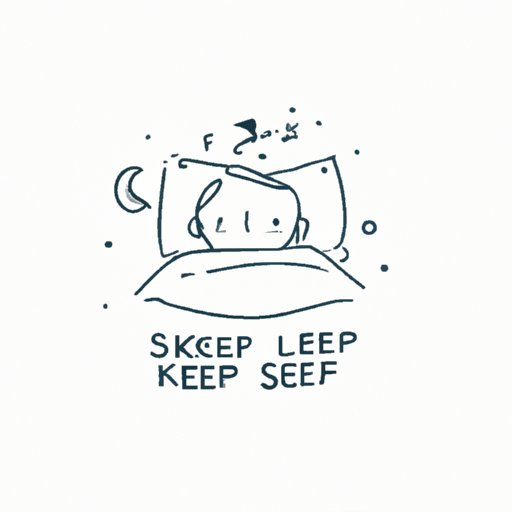
I. Introduction
Do you have trouble falling asleep at night? If so, you are not alone. According to the National Institutes of Health, more than 30% of adults report symptoms of insomnia. Poor sleep can impact your mood, cognitive function, and overall quality of life. The good news is that there are practical solutions and tips for falling asleep quickly that you can start incorporating into your routine today.
II. Practice relaxation techniques before bedtime
Relaxation techniques can help prepare your body and mind for sleep. Options include deep breathing exercises, progressive muscle relaxation, or even yoga. By calming your central nervous system, relaxation techniques can reduce stress and anxiety, helping you to fall asleep more easily.
To incorporate relaxation into your bedtime routine, try practicing for 10-15 minutes before getting into bed. Find a quiet, comfortable spot in your home, and focus on deep breathing while clearing your mind of distracting thoughts. Over time, you may find that relaxation becomes a habit and that you naturally drift off to sleep more quickly.
III. Create a sleep-friendly environment
It’s important to create an environment that supports restful sleep. Your bedroom should be cool, dark, and quiet to promote relaxation. Minimizing external distractions, such as using earplugs or investing in a white noise machine, can help as well.
Other sleep-promoting tips include being comfortable in your bed and avoiding bright screens (such as phones or tablets) for at least an hour before bed.
IV. Establish a regular sleep schedule
A regular sleep schedule will help to train your body to recognize when it’s time to sleep. Aim to go to bed and wake up at the same time each day, even on weekends. It may take some time to adjust to a new sleep schedule, so be patient and stick with it.
If you have trouble falling asleep, avoid naps during the day and try going to sleep at the same time every night. Over time, you may find that you are naturally more tired when it’s time to sleep.
V. Use your bed only for sleeping and sex
It’s important to associate your bed with sleep in your mind. When you use your bed for other activities, such as watching TV or working, it can disrupt your sleep patterns. Try to reserve your bed for sleeping and intimate activities only.
While you are awake, do other activities outside of the bed like reading, relaxing in your favorite chair, or taking a bath to signal to your body it’s not time to sleep yet.
VI. Avoid sleep-disruptive substances
Some substances can significantly impact the quality of sleep you receive, and thus, how quickly you fall asleep. Avoid nicotine, caffeine, and alcohol, especially before bedtime.
Caffeine is a stimulant usually found in coffee or soda, which could take several hours or more to wear off. Nicotine is also a stimulant and can lead to light, fragmented sleep. Although alcohol can make you feel sleepy, it leads to a night of disturbed rest and frequent waking up.
VII. Eat light and avoid certain foods
What you eat significantly affects your body and, thus, your sleep quality. Eat light meals at dinner time and avoid big meals before bedtime. Skimping on important nutrients like protein or healthy fats should be avoided as well.
Along with this, avoid spicy or acidic foods when having dinner because they could lead to heartburn, which might disrupt sleep. Try to eat foods that have tryptophan as this amino acid helps to promote restful sleep. Some of the foods that have tryptophan are nuts, milk, bananas or turkey.
VIII. Consider natural sleep aids
Natural remedies or supplements can be great for a sleep aid. Natural remedies like chamomile tea or valerian root supplements can be used to promote sleep. However, it is important to consult your doctor before using any supplement or natural remedies to avoid any potential complications.
IX. Conclusion
Falling asleep quickly can be a frustrating problem to have, but there are ways to address the issue. By practicing relaxation techniques, creating a sleep-friendly environment, establishing a regular sleep schedule, using your bed only for sleeping, and avoiding sleep-disruptive substances and foods, you can improve the quality of your sleep.
Along with the above tips, consider finding a sleep routine that works for you to maximize your sleep efficiency. Don’t hesitate to experiment with different strategies to find what works best for you. Remember, taking care of your sleep is essential to ensure that you have a happy and healthy lifestyle.





